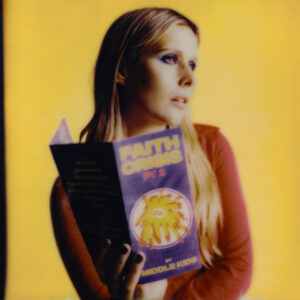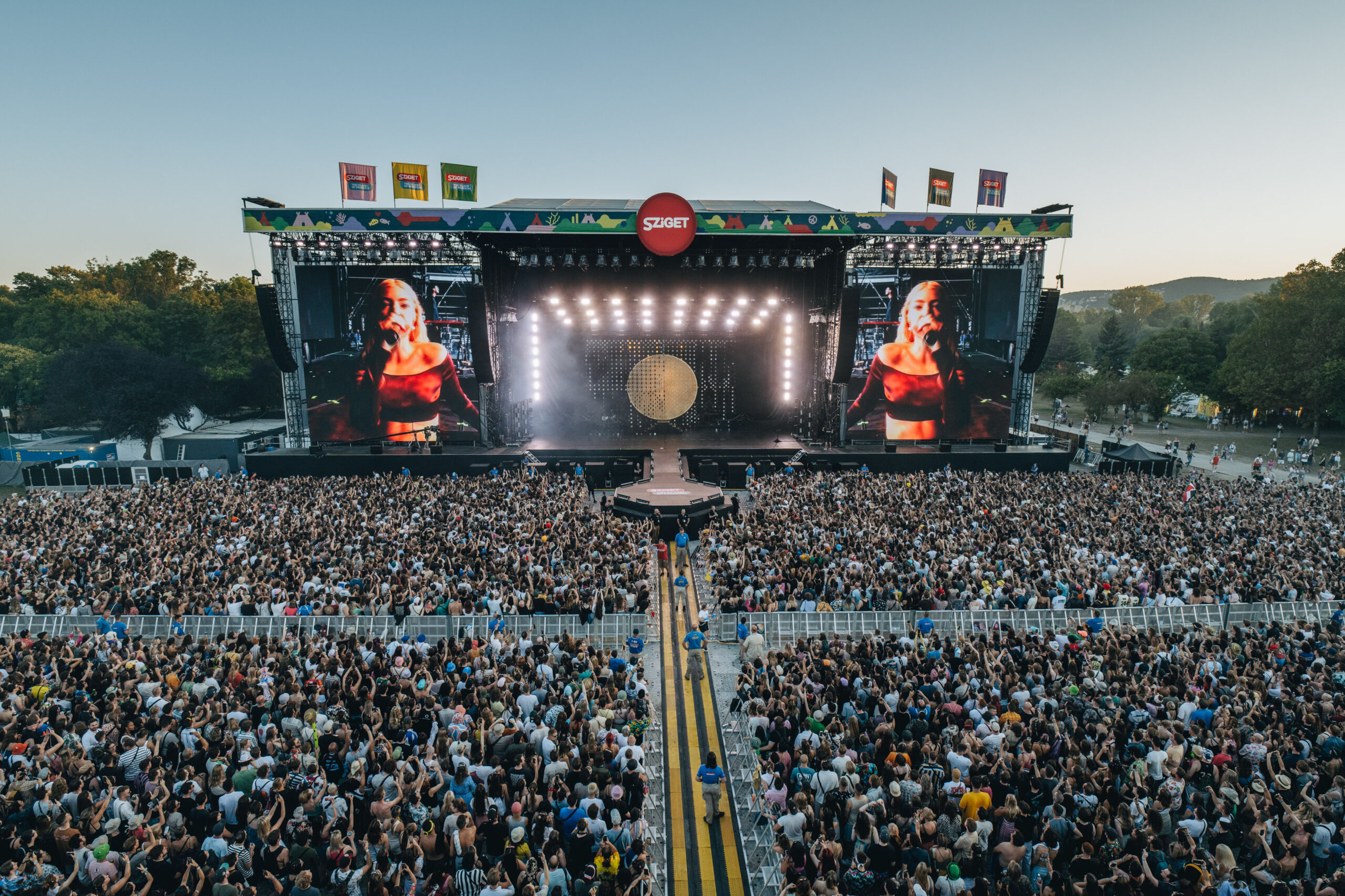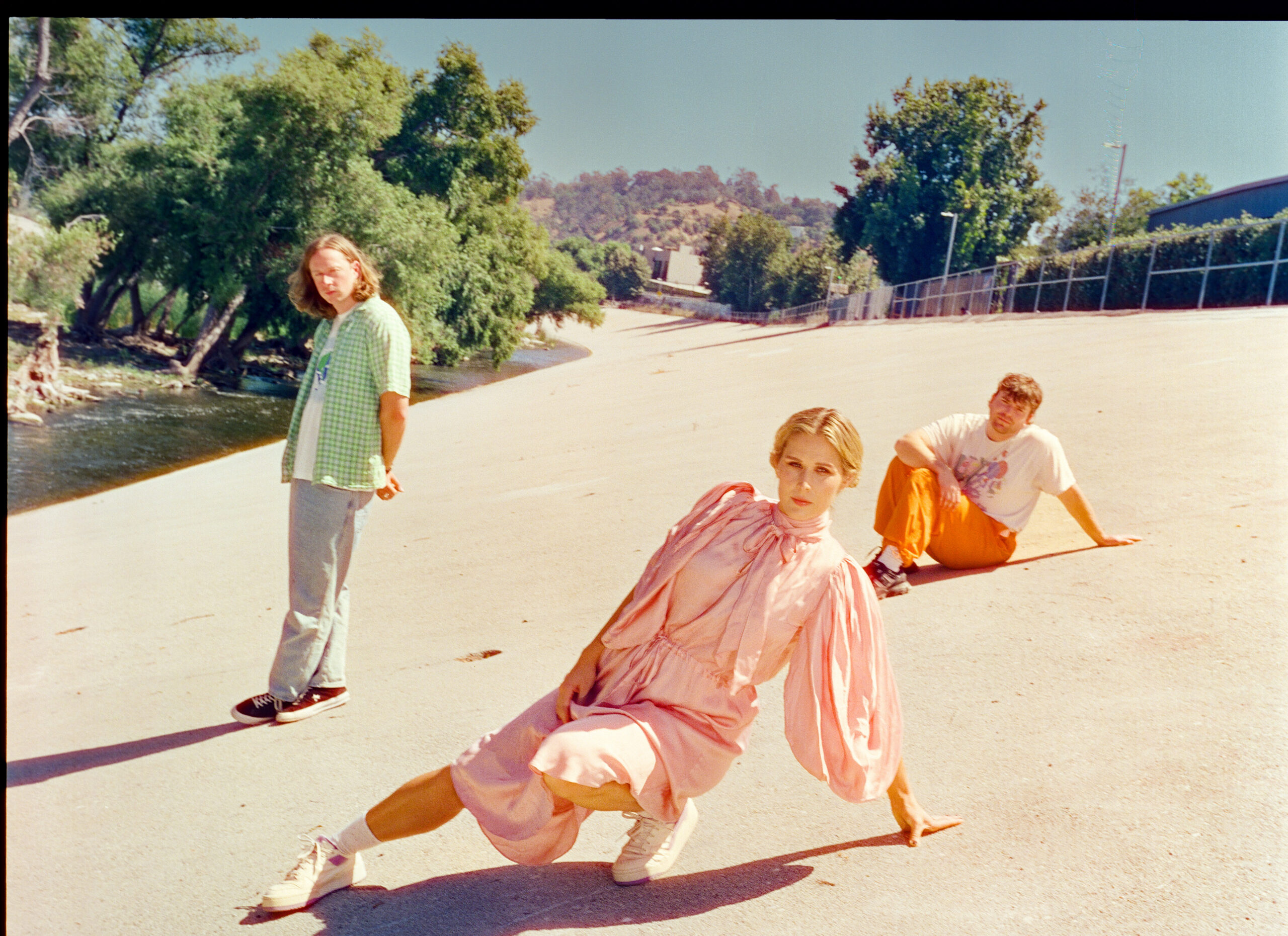Das Trio Middle Kids aus Sydney hat am 16. Februar ihr drittes Album Faith Crisis Pt 1 via Lucky Number veröffentlicht. Durch Indierocksongs mit Ohrwurmqualität haben sie einst unser Herz erobert, doch die neue Platte will mehr. Instrumentale Zwischenstücke, harte Brüche zwischen den Tracks und immer wieder die Fragen nach dem Sinn, nach Hoffnung, dem Glauben an Erneuerung und der Akzeptanz, dass es immer weiter geht, weil Krisen Teil des Prozesses sind.
Wir haben Mitte Januar mit Hannah Joy via Zoom über genau diese Themen gesprochen. Im Interview erfahren wir, was es mit dem mysteriösen Plattentitel auf sich hat, warum Glaubenskrisen okay und manchmal sogar schön sind und dass Songs erst auf Tour so richtig zum Leben erweckt werden. Wir sprechen außerdem über die Weiterentwicklung ihres Sounds, warum dem Entstehen des Albums eine Schreibblockade voran ging und wie sie die Zeit in England mit Produzenten Jonathan Gilmore erlebte. Bewegende Zeiten – bewegende Platte.
 Congratulations on your new album. Faith Crisis Pt 1 is such a complex title. What is it about?
Congratulations on your new album. Faith Crisis Pt 1 is such a complex title. What is it about?
We called it that because after we made the record, it was very clear that a common theme through all the songs was the crisis of faith. I think a lot of it is a personal journey that I was going through when I wrote the album. But also, we were and are in a time of a crisis of hope or a feeling that it is hard to be hopeful about things – a time of fear and anxiety. It is a personal thing, but it is in line with a lot of what is going on in the world. The part one is trying to say that there will probably be more parts of a faith crisis. We were wondering if people thought that meant there was going to be a part two of the record, and maybe there will be, but we like the idea of part one talking about the fact that there are actually going to be more crises of faith and almost saying that that is okay; that it is just part of life. We will have these beliefs of what we think is true and then we will have an experience that totally shatters that. You have to work through it and rebuild. It will happen again and again as we go through life. We like the idea of keeping it open like that.
The record talks about crisis and finding yourself in a mess and then trying to figure out how to get out of it. But it almost always has this look beyond. You do not walk away with a devastated feeling. Quite the opposite. I was wondering if that came from the process of working through things.
It probably came through the process and learning to accept that life is full of pretty crazy shit a lot of the time. For a long time, when things were hard, I felt like it shouldn’t be that way, like why is this happening? But it is very liberating or almost comforting to know that it does not make it okay, but nothing is wrong. Life is hard and full of hectic shit all the time. So once you get over the shock of feeling like it shouldn’t be this way and accepting that it is this way, I found that you could move through it more. You could see the beauty and the hope more, because it is actually just a part of life, but it is not the only thing that is a part of life. There are other things happening at the same time, and as you move through life, you discover a lot of who you are in the crises. And that is a really beautiful thing. Even writing this record for myself was a very helpful process to zoom out a little bit and see. I am quite a head person. It is easy for me to be like, I am fine, I am fine, I am fine. But a lot of times I will write songs and almost be like, “Oh, this is interesting that this is going around in there. I should probably connect to that.” Those are little red flags that come up when I write songs.
There are a lot of tonal shifts between songs, like Highlands and Bend. It is such a multifaceted record, just like the crises you described. Where did you get your inspiration, sonically and lyrically?
This time we were particularly careful with the sound. We worked with Jon Gilmore in England, who we were really drawn to because of the sounds he pulls. It was a big step for us to get someone involved at that level. He had a lot more involvement in terms of production and helping shape the songs. We really wanted to have beautiful, elevated sounds with a lot of intensity still on the drums and guitars to help convey the mix of emotions and the saltiness of things. There is something and then there is a cohesion that can happen. The general style of my songwriting and the kind of sounds that we use all the way through help bring it together. Highlands to Bend is a good example, it is something that I will feel a lot. Highlands is this song that feels like freedom and like you can do it and then it goes, “No, I cannot do it.” I can very easily be in that place where I am working myself up and a day later be like, “No!” A lot of it was not even conscious, but some of the songs we definitely felt like they would go well together. In terms of the arc of the record, we went with our gut. Then we had a couple of instrumental interludes that were kind of breathers after some of the more intense stuff, just to take a second.

I found the interludes very touching. How did you decide to structure the record that way?
I am very glad we put them on because I think a lot of times when we actually cut the song, we end up cutting a lot of the fat. I will write a song and there will be like a long intro, there will be an instrumental between the chorus and the second verse, and then we end up cutting it down to make it a little bit snappier. I think it serves the songs well, especially in this modern time of just putting everything out there. But I often miss some of the spaces that you can go into with instrumental music. So, when we were in the studio, particularly for those two interludes, we were actually just jamming and it happened really organically. It felt good to have them on the record because I grew up listening to a lot of classical instrumental music and I find that music can speak to you when words do not get in the way. It helps you or the listener to have their own words because music connects on that soul level. It is almost me getting out of the way. It is having some moments on the record where you can reflect and just experience the music and let it speak to you. That was very meaningful to all of us because even though we are a very song-centric band, we also just love music. We all felt that it had a great impact on us beyond the lyrics and the words.
 You recorded with Jon Gilmore in Britain. For Today We’re The Greatest you worked in LA. Why do you like to get away from home to record?
You recorded with Jon Gilmore in Britain. For Today We’re The Greatest you worked in LA. Why do you like to get away from home to record?
It is good for us to get out of where we are. I think it is cool. We do a lot of writing in and around the house and around Australia and particularly with this record we wanted to work with Jonathan. Even though we spend a lot more time in America than we do in the UK and Europe, I think some of my most fundamental influences for indie music are from Britain and the UK. I just really wanted to be in that space and make this record and work with someone who was also involved in that scene. I think something cool happens when you work with people. It really is about the person you find. We wanted to work with Jonathan and then we wanted to work with Lars in LA. It is cool to be in a different space and a different culture for the actual making of the record. I am very affected by the place I am in. It brings out different things. I like to experiment with that. It is exciting for me to try new places. Not for no reason, but significant places, just to see what kind of thing you make.

Does getting out of your mundane life make things easier or harder? Two of you are married, the three of you are very close friends. There are so many factors at play.
It simplifies it more. It is complicated, but I think making a record is complicated no matter how you do it. As long as you can accept that any way you do it is going to have a number of complications. It was cool just to be in this city for five weeks and we were all in this flat together. It was really intense. But it was easy because we were there to make the record and we almost killed ourselves doing it. But it was cool to go down the funnel and do it together. It feels like a real privilege to be able to dedicate like five weeks of your life to honoring these songs and trying to bring them to life. It was very focused and intentional. I much prefer that because when I am at home I have things pulling me all over the place. I am kind of a scatty person. I am pretty extroverted, so I go out. It is almost like I have to separate myself to get anything done.
Between the recording in 2022 and the album release was a pretty extensive tour. Did you play the new songs? Does that change your relationship to them?
We play some of them. Playing them live helps you get to know them in a whole different way because you share them and there are different energies. I will write a song and then I will record it and then I will never play it again until we start touring. So in a lot of ways the songs are still pretty unknown to me. The songs that we have been touring with for years just have a different role in my life. It’s funny to have these songs because we have only played maybe three or four of them live. But it is always such a special thing to do. You find those moments where people naturally sing along more or connect with them and they get this new life. But I was glad to have had this big tour just to play them. I am having a baby next week, so we will not be able to tour for a while, but a few months after that we will start touring the record properly, which I am so excited about, because they come alive.
With the last record you said that you learned so many things about coming together as friends and as a band and letting other people into your working process. What are you taking away from Faith Crisis Pt. 1?
A big takeaway for me on this record is that there is always the next thing. There is always room to go deeper and be more vulnerable and stretch yourself. I feel like we did that on this record. It is probably more vulnerable for me than other records. I really had to work hard to get some of these songs out. I am amazed at the infinite nature of music and story. It took a lot of work to make this record and it was a big challenge, but it was so, so good. And I feel very excited about the unknown of the next one, but very expectant from this last one. It took me a long time to write that record. After the second one, I really struggled to write for a while. It was a very scary place to be because it had always been a very natural thing for me to write. I never really related to the idea of writer’s block or anything like that. And then I was like, “Oh, this is it.” And also just trusting that if you keep chipping away at it, you will find the next thing. That was a huge takeaway for me, just to hold the course. Keep going. I feel like that is a very exciting, beautiful journey to be on.
Thank you for the interview!










